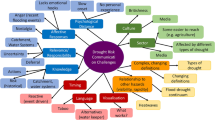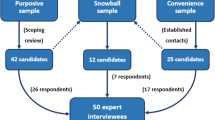Abstract
As part of a larger transdisciplinary sea level rise (SLR) research project, six face-to-face, repeated focus groups with stakeholders (coastal resource managers and environmental communications professionals) were conducted in three states (Alabama, Florida, Mississippi) in the northern Gulf of Mexico. The purpose was to collect input on development of the project’s scientific research and models and gather future project outreach recommendations. This paper reports on the outreach-related results, which synergistically grew to encompass not only project-specific outreach but also broader concerns of stakeholders pertaining to risk communication. Participants believed outreach on SLR preparation was urgently needed and could be facilitated with a multifaceted targeted approach despite various challenges. Analysis revealed five target audience recommendations, six message content and format recommendations, and eight message delivery recommendations. Overall, the study provides empirical support for the perceived value and added benefits of social science, particularly qualitative methods, to foment transdisciplinary projects and for effective SLR communication. The paper concludes with a discussion of connections to the transdisciplinary research and risk communication literature followed by practical and future research implications.
Similar content being viewed by others
References
Akerlof KL, Rowan KE, La Porte T, Batten BK, Ernst H, Sklarew DM (2016) Risky business: engaging the public on sea level rise and inundation. Environ Sci Pol 66:314–323
Allen E, Kruger C, Leung F-Y, Stephens JC (2013) Diverse perceptions of stakeholder engagement within an environmental modeling research team. J Envtl Studies Sci 3:343–356
Barron S, Canete G, Carmichael J, Flanders D, Pond E, Sheppard S, Tatebe K (2012) A climate change adaptation planning process for low-lying, communities vulnerable to sea level rise. Sustainability 4:2176–2208
Berg BL, Lune H (2012) Qualitative research methods for the social sciences. Pearson, Boston
Braman D, Kahan DM, Peters E, Wittlin M, Slovic P (2012) The polarizing impact of science literacy and numeracy on perceived climate change risks. Nat Clim Chang 2:732–735
Brandt P, Ernst A, Gralla F, Luederitz C, Lang DJ, Newig J, Reinert F, Abson DJ, von Wehrden H (2013) A review of transdisciplinary research in sustainability science. Ecol Econ 92:1–15
Brown VA (2010) Collective inquiry and its wicked problems. In: Russell JY, Harris JA, Brown VA (eds) Tackling wicked problems through the transdisciplinary imagination. Routledge, New York, pp 53–68
Cagle LE, Tillery D (2015) Climate change research across disciplines: the value and uses of multidisciplinary research reviews for technical communication. Tech Commun Q 24:147–163
Covi MP, Kain DJ (2015) Sea-level rise risk communication: public understanding, risk perception, and attitudes about information. Environ Commun 10:612–633
DeLorme DE, Kidwell D, Hagen SC, Stephens SH (2016) Developing and managing transdisciplinary and transformative research on the coastal dynamics of sea level rise: experiences and lessons learned. Earth’s Future 4:194–209
Eisenhauer BW, Nicholson B (2005) Using stakeholders’ views: a social science methodology for the inclusive design of environmental. Appl Environm Educ Commun 4(1):19–30
Fontana A, Frey JH (1994) Interviewing: the art of science. In: Denzin NK, Lincoln YS (eds) The Sage handbook of qualitative research. Sage, Thousand Oaks, pp 361–376
Franks S, McDonnell J, Peach C, Simms E, Thorrold A (2006) Education and public outreach: a guide for scientists. Oceanographic Society, Rockville
Frazier TG, Wood N, Yarnal B (2010) Stakeholder perspectives on land-use strategies for adapting to climate-change-enhanced coastal hazards: Sarasota. Florida Appl Geog 30:506–517
Glicken J (2000) Getting stakeholder participation ‘right’: a discussion of participatory processes and possible pitfalls. Environ Sci Pol 3:305–310
Hede S (2011) Lull after the storm? Municipal leaders reflect on multiple crisis experience. Disaster Prep and Management 20:281–293
Kidwell DM, Dietrich JC, Hagen SC, Medeiros SC (2017) An Earth’s future special collection: impacts of the coastal dynamics of sea level rise on low-gradient coastal landscapes. Earth’s Future 5:2–9
Krueger RA, Casey MA (2000) Focus groups: a practical guide for applied research. Sage, Thousand Oaks
Leavy P (2011) Essentials of transdisciplinary research: using problem-centered methodologies. Taylor and Francis, New York
Lejano RP, Tavares-Reager J, Berkes F (2013) Climate and narrative: environmental knowledge in everyday life. Environ Sci Pol 31:61–70
Lemos MC, Morehouse BJ (2005) The co-production of science and policy in integrated climate assessments. Glob Environ Chang 15:57–68
Lincoln YS, Guba EG (1985) Naturalistic inquiry. Sage, Newbury Park
Lindenfeld LA, Hall DM, McGreavy B, Silka L, Hart D (2012) Creating a place for environmental communication research in sustainability science. Environ Commun 6(1):23–43
Lindloff TR, Taylor BC (2011) Qualitative communication research methods. Sage, Thousand Oaks
Lorenzoni I, Jones M, Turnpenny JR (2007) Climate change, human genetics, and post-normality in the UK. Futures 39:65–82
Luyet V, Schlaepfer R, Parlange MB, Buttler A (2012) A framework to implement stakeholder participation in environmental projects. J Environ Manag 111:213–219
Morgan DL (2012) Focus groups and social interaction. In: Gubrium JF, Holstein JA, Marvasti AB, McKinney KD (eds) The Sage handbook of interview research: the complexity of the craft. Sage, Los Angeles, pp 161–176
Morgan D, Fellows C, Guevara H (2008) Emergent approaches to focus group research. In: Hesse-Biber SN, Leavy P (eds) Handbook of emergent methods. Guilford, New York, pp 189–205
Moser SC (2010) Communicating climate change: history, challenges, process and future directions. WIREs Climate Change 1:31–53
Moser SC, Ekstrom JA (2011) Taking ownership of climate change: participatory adaptation planning in two local case studies from California. J Environ Studies Sciences 1:63–74
Nettley A, Desilvey C, Anderson K, Wetherelt A, Caseldine C (2014) Visualising sea-level rise at a coastal heritage site: participatory process and creative communication. Landsc Res 39(6):647–667
Newig J, Veronika G, Berkhoff K, Kaldrack K, Kastens B, Lutz J, Schlumeier B, Adensam H, Haberl H (2008) The role of formalization, participation and context in the success of public involvement mechanisms in resource management. Syt Pract Action Res 21:423–441
Nicholson-Cole SA (2005) Representing climate change futures: a critique on the use of images for visual communication. Comput Environ Urban 29:255–273
Nind M, Vinha H (2016) Creative interactions with data: using visual and metaphorical devices in repeated focus groups. Qual Res 16(1):9–26
Pidgeon N, Fischhoff B (2011) The role of social and decision sciences in communicating uncertain climate risks. Nat Climate Change 1:35–41
Rowe J, Frewer L (2005) A typology of public engagement mechanisms. Sci Technol Hum Values 30(2):251–290
Schoenefeld JJ, McCauley MR (2016) Local is not always better: the impact of climate information on values, behavior and policy support. J Environ Stud Sci 6(4):724–732
Shelton M, Stephens S, Berte M, DeLorme D, Grove A, Hagen S, Hanisko M, Lamier H, Love N, Stiller H (2016) Connecting scientists to citizens regarding sea level rise. Social Coast Forum, February 9–11, Charleston, SC
Smith N, Leiserowitz A (2012) The rise of global warming skepticism: exploring affective image associations in the United States over time. Risk Anal 32(6):1021–1032
Stewart DW, Shamdasani PN (2015) Focus groups: theory and practice. Sage, Los Angeles
Strauss A, Corbin J (1998) Basics of qualitative research: grounded theory procedures and techniques. Sage, Newbury Park
Talley JL, Schneider J, Lindquist E (2016) A simplified approach to stakeholder engagement in natural resource management: the five-feature framework. Ecol Soc 21(4):38
Trench B (2008) Towards an analytical framework of science communication models. In: Cheng D, Claessens M, Gascoigne NRJ, Metcalfe J, Schiele B, Shi S (eds) Communicating science in social contexts. Springer, New York, pp 119–135
van der Linden S, Maibach E, Leiserowitz A (2015) Improving public engagement with climate change: five “best practice” insights from psychological science. Perspectives on Psychol Sci 10(6):758–763
Wickson F, Carew AL, Russell AW (2006) Transdisciplinary research: characteristics, quandaries and quality. Futures 38(9):1046–1059
Acknowledgements
This research was funded in part under award NA10NOS4780146 from the National Oceanic and Atmospheric Administration (NOAA) Center for Sponsored Coastal Ocean Research. The authors wish to thank management and staff of the Apalachicola, Grand Bay, and Weeks Bay National Estuarine Research Reserves as well as the NOAA Office of Coastal Management.
Author information
Authors and Affiliations
Corresponding author
Ethics declarations
Research procedures were approved by the appropriate Institutional Review Board prior to beginning the study.
Rights and permissions
About this article
Cite this article
DeLorme, D.E., Stephens, S.H. & Hagen, S.C. Transdisciplinary sea level rise risk communication and outreach strategies from stakeholder focus groups. J Environ Stud Sci 8, 13–21 (2018). https://doi.org/10.1007/s13412-017-0443-8
Published:
Issue Date:
DOI: https://doi.org/10.1007/s13412-017-0443-8




